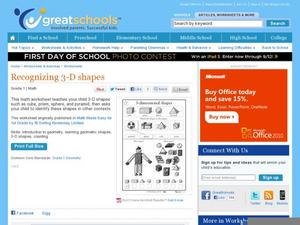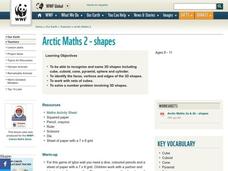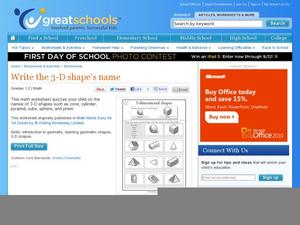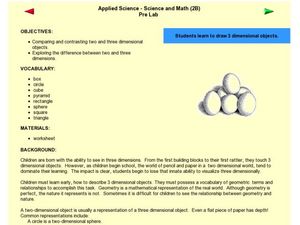Illustrative Mathematics
3-D Shape Sort
From the apple on your desk and the coffee cup in your hand, to the cabinets along the classroom wall, basic three-dimensional shapes are found everywhere in the world around us. Introduce young mathematicians to the these common figures...
Curated OER
Sorting 3-Dimensional Shapes
Three-dimensional shapes can be categorized based on their attributes, and scholars learn more about six figures through this sorting activity. They examine six shapes: sphere, cylinder, cone, cube, prism, and pyramid....
Curated OER
Recognizing 3-Dimensional Shapes
Three-dimensional shapes are all around us; expose young geometers to this concept as they focus on identifying four figures: cube, prism, sphere, and pyramid. Learners begin by matching four objects to the shape each...
Curated OER
Classifying Three-Dimensional Shapes
Compare geometric solids based on their properties. Your emergent geometers use spaghetti and marshmallows to build models so they can examine the number of faces, edges, and vertices on polyhedra of their own creation. Resource includes...
Curated OER
Sorting 3-Dimensional Shapes
The sorting is simple here: Does this three-dimensional figure have a curved surface or not? Scholars review an example before trying this on their own with nine figures including a sphere, cylinder, prism, cube,...
Curated OER
3-Dimensional Shapes
Where is the vertex? Each of these three-dimensional figures is drawn so learners can see all sides and corners. They examine an example before trying six on their own. Some of these will be tricky, so be sure kids have covered this...
World Wildlife Fund
Shapes
Investigate the properties of three-dimensional figures with this Arctic-themed math lesson plan. Beginning with a class discussion about different types of solid figures present in the classroom, young mathematicians are then given a...
Curated OER
Write the 3D Shape's Name
Can your first graders identify a cone? What about a cube? Or a prism? Help them find the differences between these shapes with this worksheet, which provides a word bank for three-dimensional shapes. For extra practice, bring in...
Curated OER
Sorting 3-Dimensional Shapes
Does it have corners? Scholars sort three-dimensional figures into one of two categories based on whether or not they have corners. They look at six shapes: sphere, cylinder, cone, cube, prism, and pyramid. For each,...
Curated OER
Can You Name That Shape?
Learners use materials to build, investigate, and draw two-dimensional shapes (polygons). They combine the shapes they have built and draw from the pile to begin a round-robin activity to name and determine the attributes of a selection...
Utah Education Network (UEN)
Geo Shapes
Invite your first graders to compose and decompose two and three-dimensional figures with this fun, hands-on instructional activity. They investigate and predict the results of putting together and taking apart two-dimensional shapes...
Curated OER
Making Two-Dimensional Shapes- Matching Worksheet
Now that your learners recognize two-dimensional shapes, can they find what each half of those shapes would look like? There are seven shapes on this worksheet, bisected by a dotted line. Scholars examine these shapes and match them to a...
Curated OER
Naming 2-Dimensional Shapes
Inside each of these two-dimensional shapes, scholars identify the figure by writing its name. There is a word bank for them to work from, but some shape names are used multiple times. There are six identifiers they use: pentagon,...
Curated OER
2-Dimensional Shapes: Drawing Shapes
Some of the best practice with shape identification comes from drawing the figures first-hand. Young geometers draw nine two-dimensional shapes: rectangle, circle, square, pentagon, hexagon, octagon, triangle with three equal sides,...
Curated OER
Cylinder: Student Worksheet
Pairs of geometry whizzes work together to determine which of three differently shaped cylinders will have the greatest volume. Pupils cut out the three rectangles embedded in the plan, and tape them together to form a cylinder. From...
Curated OER
Draw 3 Dimensional Objects
Bring three-dimensional shapes to life in your classroom. First introduce the vocabulary of three-dimensional shapes, such as sphere, cube, and pyramid. Then, show your kids examples of how to use two-dimensional objects draw...
Mathed Up!
2D and 3D Shapes
What a great assessment to give young mathematicians in order to test their knowledge on two- and three-dimensional shapes. Learners name various shapes, identify the number of edges, faces, and vertices, match an unfolded version of a...
North Carolina State University
Shapes
Expose youngsters to 3-D objects in a hands-on learning activity involving marshmallows and toothpicks. Engage your young mathematicians by introducing them to 3-D shapes by means of a story book. Explore 3-D shapes by manipulating...
Exploratorium
Building Three-Dimensional Structures
Are you looking for a good 3-D geometry lesson plan that includes hands-on activities for your middle schoolers? Look no further than this one! Pupils use centimeter grid paper embedded in the plan, along with detailed construction...
Curated OER
Three-Dimensional Shapes
In this three-dimensional shapes worksheet, students cut out shape names and paste them next to the pictured objects that they name.
Curated OER
Great Shapes Alive!
Compare two- and three-dimensional shapes and construct three dimensional models from two-dimensional shapes. Diagram the shapes and reflect about the process in writing.
Curated OER
Shapes
Fifth graders explore shapes. They recognize and name two-dimensional and three-dimensional shapes. Pupils discuss the properties and criteria for each shape they find in real life and construct a Kid Pix project using pictures of the...
Curated OER
Applied Science - Science and Math Lab
Create three dimensional objects in an applied science lesson. The goal is for your class to recognize, compare, and model shapes. Using cookie cutters and clay or play dough, they create models for three-dimensional shapes.
Curated OER
Views of Shapes
For this math worksheet, students examine the two and three dimensional shapes. They use the observations in order to define the different points of view.

























